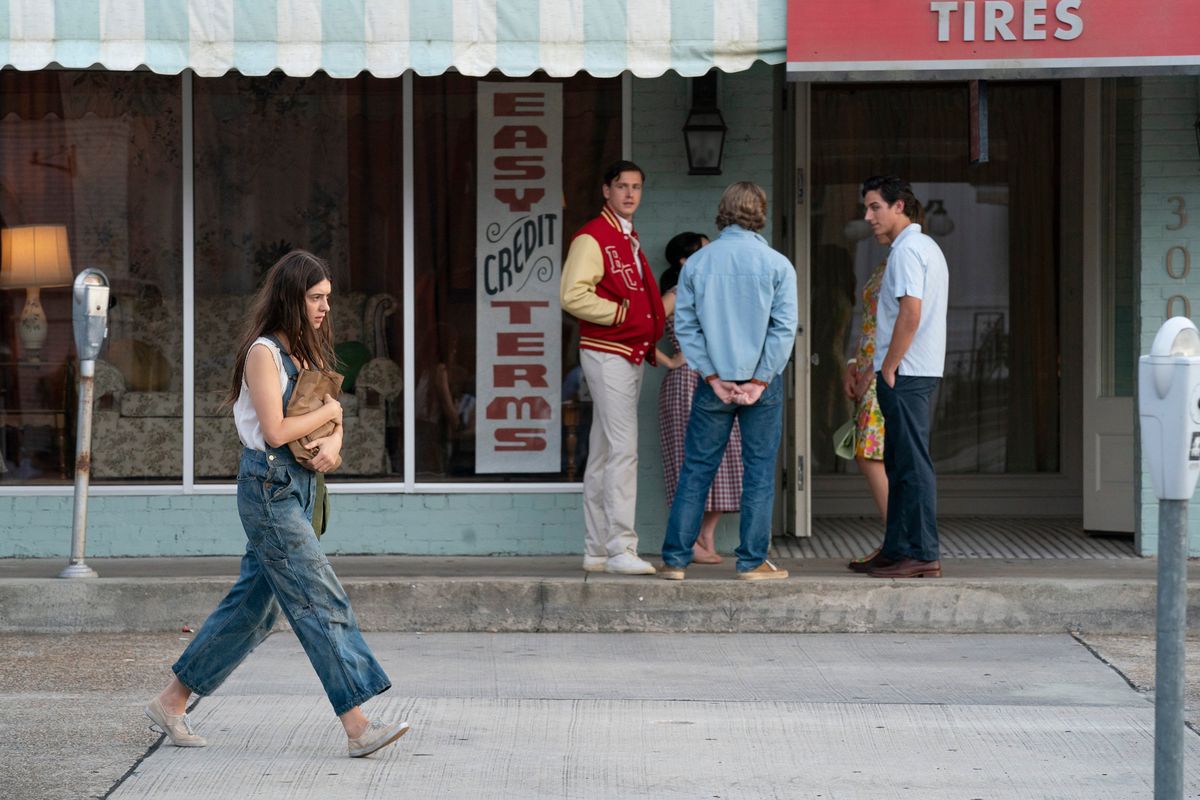‘Where the Crawdads Sing’: ‘Blue Lagoon’ meets ‘Murder, She Wrote’

“I don’t know if there’s a dark side to nature,” says the budding-conservationist protagonist of “Where the Crawdads Sing.” “Just inventive ways to endure.”
That’s how Kya Clark (Daisy Edgar-Jones) sums up her views on the animal kingdom – and humanity – in this lyrical coming-of-age story (which also doubles as a murder mystery). First-time director Olivia Newman, adapting Delia Owens’s 2018 bestseller, paints a lush picture of Southern marshland, using large brushstrokes that sometimes recall a Nicholas Sparks melodrama. Yet underneath all the natural beauty lurks something dark indeed.
The film begins in 1969, with Louisiana filling in for the fictional coastal town of Barkley Cove, N.C. Police are investigating the death of a young man named Chase Andrews (Harris Dickinson) – the prime suspect being Kya, a recluse who has spent much of her young life living alone in the woods. Most townspeople call her “Marsh Girl” and know she had been romantically involved with Chase. They assume the worst of someone they’ve long thought of as a wild child. Fortunately for Kya, gentleman lawyer Tom Milton (David Strathairn) comes out of retirement to defend her.
As Kya tells her story to Tom, the “Crawdads” timeline shifts from the murder investigation to flashbacks of Kya’s troubled childhood. When she was little, Kya (Jojo Regina) stood by as her mother and, eventually, all her siblings ran away from home to escape their drunken, abusive father (Garret Dillahunt). The film’s title is taken from the advice of Kya’s big brother, Cody, who, as he leaves home, tells his 9-year-old sister where to hide when Pa comes looking for a punching bag.
In time, even Pa leaves. Yet there are people looking out for Kya. People like Jumpin’ and Mabel (Sterling Macer Jr. and Michael Hyatt), who run the local supply store, and, most crucially, people like Tate (Taylor John Smith), who befriends her, teaches her how to read and write, and gradually falls in love with her. “I didn’t know words could hold so much,” she tells him, before he, too, abandons her.
“Marsh is not swamp,” Kya narrates as the film begins. “Marsh is a space of light, where grass grows in water, and water flows into the sky.” But as much as “Crawdads” seems to rhapsodize about nature, this is a violent paradise that at times suggests a young adult drama directed by Werner Herzog. (Yes, that Werner Herzog.)
London-born Edgar-Jones (“Cold Feet”) convincingly portrays Kya’s haunted shyness, though she doesn’t really look like somebody you or I would shun: Even though she’s raised herself in the woods, her pastoral wardrobe is less feral child than, say, Anthropologie’s summer collection. As Kya’s contrasting young beaus, Dickinson and Smith look pretty much interchangeable, but each actor aptly conveys his respective role: brutal jock in the case of Chase, and sensitive scholar for Tate. With Strathairn’s gentle gravitas suggesting an elderly Atticus Finch, much of “Crawdads” seems like a misty-eyed look at an innocent American past. Not to spoil things, but that’s not exactly what plays out.
Screenwriter Lucy Alibar (“Beasts of the Southern Wild”) adapts the source material with a nod to the magic realism that characterized her Oscar-nominated screenplay for that 2012 drama, co-written with director Benh Zeitlin. But although set in a similarly rural environment and, like “Beasts,” revolving around a father and daughter, “Crawdads” is much more conventional, its tone shifting from young love to a small-town crime story. It’s Southern-fried “The Blue Lagoon” meets “Murder, She Wrote” – and topped off with a sprinkling of “To Kill a Mockingbird.”
But there’s a more curious resonance with Owens’s own personal life. According to a recent Atlantic article, the “Crawdads” author is wanted for questioning in Zambia in connection with the 1995 killing of an alleged poacher – whose execution was captured on videotape and, the article suggests, may have been carried out by a member of Owens’ family. (There is no statute of limitations on murder in Zambia.)
One might wonder whether the fictional narrative of the beleaguered waif in a judgmental small town is Owens’s way of addressing something in her own past. If there’s an impulse to see Kya as a somewhat Edenic figure, don’t be so quick to judge.
As Taylor Swift sings in “Carolina,” the film’s closing song – which, in its lyrics about “creeks runnin’ through my veins,” bridges pop music with Americana – there’s also an ominous warning: “Muddy these webs we weave.”